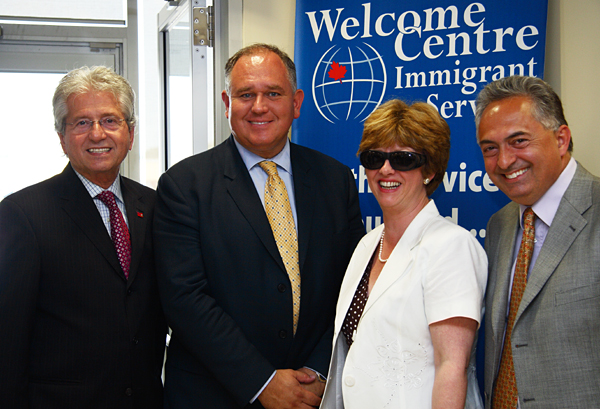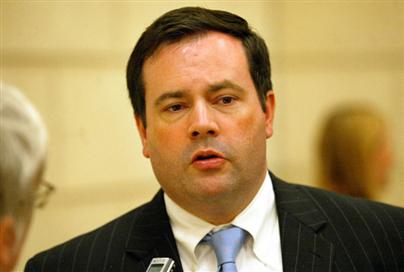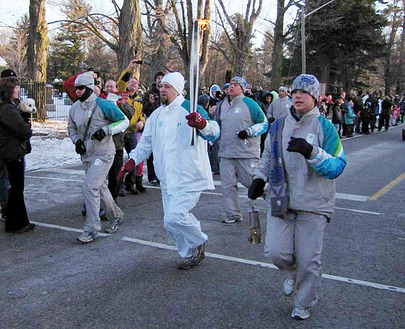Government of Canada Invests in Four New York Region Welcome Centres

Take our FREE Online Assessment Today!
Socialize with Abrams & Krochak
Minister Kenney Announces Reappointment to the Canadian Race Relations Foundation
A reappointment to the Canadian Race Relations Foundation’s (CRRF) Board of Directors was announced today by Citizenship, Immigration and Multiculturalism Minister Jason Kenney.
“The Canadian Race Relations Foundation is committed to building a national framework for the fight against racism in Canadian society,” said Minister Kenney. “This government seeks to fill the Board with qualified individuals who can provide dedicated expert advice to manage the Foundation. I look forward to Mr. Chow’s contribution to the Foundation.”
Mr. Lyn Q. Chow was reappointed for a four-year term. The Canadian Race Relations Foundation is governed by a Board of Directors consisting of a Chair and up to nineteen other directors appointed by the Governor in Council (Cabinet). CRRF directors serve for terms of up to four years, which are renewable.
Canada is internationally recognized for its commitment to human rights and for its fight against all forms of discrimination, including racism. The Canadian Race Relations Foundation is Canada’s leading agency dedicated to the elimination of racism in the country. Governments, NGOs, and the national and international community regularly call upon the Foundation to contribute to developing policies, programs and workshops leading towards a more equitable and just society.
For a biography on the CRRF member being reappointed, please see the attached backgrounder.
BACKGROUNDER
Reappointment to the Canadian Race Relations Foundation
One member was reappointed to the Canadian Race Relations Foundation. Biography of the members is below.
Mr. Lyn Q. Chow
Calgary, AB
A professional electrical engineer, Mr. Chow was employed by Manitoba Hydro for 33 years and retired as the senior manager of the engineering systems department. Previously, he was a junior engineer with the Saskatchewan Power Corporation.
Mr. Chow has also been involved in community organizations. He was a member of the board of directors of the Winnipeg Chinatown Non-profit Housing Corporation and served as its chair for two years. He was also a member of the board of directors of the Winnipeg Chinese Cultural and Community Centre.
After moving to Calgary, Mr. Chow continued his community service as a member of the board of directors of the Wu Yi Association, vice-president of the board of directors of the United Calgary Chinese Association, member of the board of directors and member of the executive committee of the Chinese Christian Wing Kei Nursing Home Association, vice-president of the board of directors of the Calgary Chinese Elderly Citizens’ Association, and member of the board of directors of the Calgary Chinatown Seniors Centre Foundation.
The Canadian Race Relations Foundation undertakes research, collects data, and develops a national information base to further an understanding of the nature of racism and racial discrimination. It provides a knowledge base from which governments, academia, business, labour and community organizations can draw for the development of effective race relations policies and practices. The Foundation also disseminates information to increase public awareness of the importance of eliminating racism.
Olympic torch relay heads for city – Track the Torch to Old City Hall
The Olympic torch which started the day in Oshawa has begun to wind its way towards the downtown. Police are asking motorists to be patient throughout the afternoon as the relay heads south on Yonge St. into the city through Richmond Hill, Thornhill and North York and then to the Scarborough Town Centre. From there it will go to City Hall to be followed by fireworks and music between 7 p.m. and 8:45 p.m. For that celebration, Bay St. will be closed from Queen St. W. to Dundas St. W.; Hagerman St. will be shut from Elizabeth St. to Bay St.; Elizabeth St. remains to be cordoned off from Dundas St. W. to Hagerman St; Albert St, from Bay St. to James St; and James St. from Queen St. W. to Albert St. This afternoon, police say there will be traffic delays and brief rolling road closures along the route and that they will be tagging and towing illegally parked vehicles. But Const. Tony Vella says that as soon as the procession passes a given street or intersection, officers will reopen roads.
Here is the route:
Richmond Hill Start 12:26 p.m.:
Hwy 7 E at Exit 25 12:40 p.m.:
North on Valleymede Dr. West on Briggs Ave.
Follows west along Bantry Ave. 1:07 p.m.:
Red Maple Rd. and Bantry Ave.
South on Yonge St. Finish 1:34 p.m.:
Yonge St. at Hwy 407 Thornhill Start 1:34 p.m.:
South along Yonge St. Finish 1:52 p.m.:
Yonge St. and Morgan Ave. North York Start 1:52 p.m.:
South along Yonge St. 2:11 p.m.: Newtonbrook Plaza Finish 2:39 p.m.:
Willowdale Plaza Scarborough Start 2:54 p.m.:
South on Grangeway Ave., from Progress Ave. South on Town Centre Ct. Through Scarborough Town Centre West on Borough Dr. 3:03 p.m.:
South at Brian Harrison Way Finish 3:36 p.m.:
Brimley Rd. and Ellesmere Rd. Toronto Start 3:41 p.m.:
Ellesmere Rd., west of Warden Ave. Follows west onto York Mills Rd. 4:21 p.m.:
York Mills and Leslie St. South along Yonge St. 5:18 p.m.:
Lawrence Park South on Yonge St. 6:06 p.m.: Bloor St. and Yonge St. 6:16 p.m.:
West on College St. from Yonge St. South on Elizabeth St. West on Elm St. 6:28 p.m.:
North on University Ave. East on Gerrard St. W South on Yonge St. West on Queen St. W Finish 7 p.m.:
Old City Hall
Take our FREE Online Assessment Today!
Socialize with Abrams & Krochak
Canada to lead G7 growth in 2010: RBC
The Canadian economy is set to rebound next year, leading growth among G7 nations, the country’s largest bank predicted Monday.
The domestic economy is expected to grow 2.6 per cent in 2010 and 3.9 per cent the year after that, after shrinking by an estimated 2.5 per cent this year, Royal Bank of Canada said in a report.
Stimulus spending, improving credit conditions and consumer spending will be the main drivers of growth, the bank said, with Saskatchewan leading the country’s economic expansion next year.
“While challenges remain, a peak in stimulus and infrastructure spending across the federal, provincial and municipal governments, along with low interest rates, should result in a sustained recovery,” said Craig Wright, the bank’s chief economist, in the report.
The peak of stimulus spending will happen next year, while better credit conditions should lift growth through to 2011, he added.
Recovery comes with a steep price tag, though the budget deficits will still be lower, relative to GDP, than the peaks reached in the early 1990s, the report said.
Altogether, the provinces are projecting shortfalls of $38.2-billion in the 2009-2010 fiscal year and at least $30.2-billion the year after that – both records in terms of value, RBC said.
Canadian consumer spending should rise 2.3 per cent next year and accelerate to 2.7 per cent in 2011.
The jobless rate, meantime, will stay high next year, averaging 8.7 per cent and peaking at 8.9 per cent before easing to 7.8 per cent in 2011. Canada’s unemployment rate is currently 8.5 per cent.
“The past year has been, by far, the toughest since the early 1990s recession and, in some cases, the early 1980s recession,” the bank said.
Activity in the housing market will stay strong, though the pace will taper off in the second half of next year due to rising mortgage rates and higher home prices.
The Canadian dollar will trade around parity, supported by rising commodity prices and as the Bank of Canada boosts interest rates before the U.S. Federal Reserve. On Monday morning, the currency was trading around 93.88 cents (U.S.).
The U.S. economy will grow 2.5 per cent next year and 3.4 per cent in 2011, RBC said.
Among provinces, Saskatchewan is likely to tally the biggest growth spurt, with 3.9-per-cent growth next year and a 4.6-per-cent increase in 2011, thanks to a pickup in potash and natural gas markets.
“This will return the province to the top of the growth ranking among provinces after likely losing this honour to Manitoba in 2009,” it said.
The slowest growth will likely be in Quebec and Prince Edward Island, at 2.2 per cent each next year.
Take our FREE Online Assessment Today!
Socialize with Abrams & Krochak
Archives
- November 2025
- June 2025
- March 2025
- February 2025
- December 2024
- October 2024
- June 2024
- May 2024
- April 2024
- January 2024
- November 2023
- July 2023
- June 2023
- May 2023
- January 2023
- November 2022
- April 2022
- March 2022
- February 2022
- October 2021
- June 2021
- April 2021
- October 2020
- September 2020
- June 2020
- May 2020
- April 2020
- March 2020
- December 2019
- January 2019
- December 2018
- November 2018
- August 2018
- June 2018
- April 2018
- January 2018
- December 2017
- November 2017
- April 2017
- January 2017
- December 2016
- November 2016
- October 2016
- September 2016
- August 2016
- August 2015
- January 2015
- December 2014
- November 2014
- June 2014
- April 2014
- March 2014
- February 2014
- December 2013
- May 2013
- April 2013
- January 2013
- December 2012
- August 2012
- June 2012
- March 2012
- January 2012
- September 2011
- August 2011
- July 2011
- June 2011
- February 2011
- January 2011
- December 2010
- November 2010
- September 2010
- August 2010
- July 2010
- June 2010
- May 2010
- April 2010
- March 2010
- February 2010
- January 2010
- December 2009
- November 2009
- October 2009
- September 2009
- August 2009
- August 2008
- July 2008
- June 2008
- May 2008
- April 2008
- March 2008
- February 2008
- January 2008



